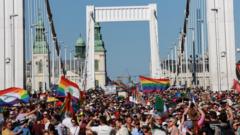This year's Budapest Pride saw a remarkable turnout, with participants rallying for human rights and challenging Prime Minister Viktor Orban's ongoing policies against the LGBTQ+ community.
Budapest Pride Draws Massive Crowd Against Orban's Opposition

Budapest Pride Draws Massive Crowd Against Orban's Opposition
Thousands took to the streets of Budapest for a vibrant Pride celebration, defying government restrictions.
On a scorching summer day, the streets of Budapest transformed into a kaleidoscope of colors as between 100,000 to 200,000 people rallied in celebration of Pride, overtaking the iconic Elisabeth Bridge and the banks of the Danube River. The atmosphere was electrifying as participants, predominantly young, walked from Pest to Buda, taking longer than usual due to the sheer volume of attendees. This was a stark contrast to last year’s Pride, which drew only 35,000 individuals.
The surge in attendance was a direct reaction to Orban’s recent attempts to hinder the event, prompting many to join the march in protest of the government's stance. Banners displayed clever jabs at Orban, and T-shirts bearing his image were humorously transformed with vibrant makeup, symbolizing a rebellion against oppression. Among these messages, one read, "In my history class, I learnt enough to recognize a dictatorship. You don't need to illustrate it - Vik!"
Budapest’s mayor, Gergely Karacsony, addressed the enthusiastic crowd, celebrating the successful defiance of the government’s ban on the march and emphasizing the importance of this collective action as a demonstration of human rights. “We look like we’re peacefully and freely performing a big, fat show to a puffed-up and hateful power,” he proclaimed, asserting the unity and resilience of those present.
Many participants voiced their concerns regarding recent government legislation equating homosexuality with pedophilia and severely limiting the freedom of assembly. Finnish MEP Li Andersson highlighted that this event transcended mere celebration for LGBTQ+ rights, underlining the broader fight for fundamental rights for all.
Despite police initially attempting to prohibit the march under the pretext of protecting children, local laws allowing municipal events to proceed were cited by the mayor, allowing the celebration to take place. The police maintained a subdued presence, as they observed a festival from which they were notably excluded.
Meanwhile, Orban engaged in a graduation ceremony for police recruits, attempting to project a narrative of order amidst the chaos of the day’s activities. The FIDESZ party presence in pro-government media criticized the Pride event, labeling it a chaotic display devoid of genuine claims to freedom of assembly.
The aftermath of this event raises questions for the courts regarding the legality of the mayor's and Pride organizers' stance against the government, creating a significant point of contention in Hungary's evolving political landscape.
Budapest remains a focal point for advocacy and resilience in the face of opposition, with its Pride celebration standing as a powerful testament to the fight for fundamental rights and freedoms across the nation.
The surge in attendance was a direct reaction to Orban’s recent attempts to hinder the event, prompting many to join the march in protest of the government's stance. Banners displayed clever jabs at Orban, and T-shirts bearing his image were humorously transformed with vibrant makeup, symbolizing a rebellion against oppression. Among these messages, one read, "In my history class, I learnt enough to recognize a dictatorship. You don't need to illustrate it - Vik!"
Budapest’s mayor, Gergely Karacsony, addressed the enthusiastic crowd, celebrating the successful defiance of the government’s ban on the march and emphasizing the importance of this collective action as a demonstration of human rights. “We look like we’re peacefully and freely performing a big, fat show to a puffed-up and hateful power,” he proclaimed, asserting the unity and resilience of those present.
Many participants voiced their concerns regarding recent government legislation equating homosexuality with pedophilia and severely limiting the freedom of assembly. Finnish MEP Li Andersson highlighted that this event transcended mere celebration for LGBTQ+ rights, underlining the broader fight for fundamental rights for all.
Despite police initially attempting to prohibit the march under the pretext of protecting children, local laws allowing municipal events to proceed were cited by the mayor, allowing the celebration to take place. The police maintained a subdued presence, as they observed a festival from which they were notably excluded.
Meanwhile, Orban engaged in a graduation ceremony for police recruits, attempting to project a narrative of order amidst the chaos of the day’s activities. The FIDESZ party presence in pro-government media criticized the Pride event, labeling it a chaotic display devoid of genuine claims to freedom of assembly.
The aftermath of this event raises questions for the courts regarding the legality of the mayor's and Pride organizers' stance against the government, creating a significant point of contention in Hungary's evolving political landscape.
Budapest remains a focal point for advocacy and resilience in the face of opposition, with its Pride celebration standing as a powerful testament to the fight for fundamental rights and freedoms across the nation.


















